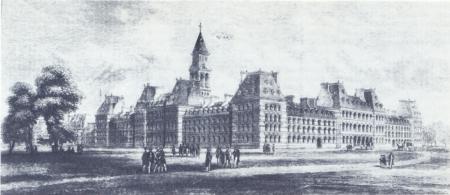The practice behind the idea of Newman's university
On the 5th of November, 1854, a new Catholic university opened in Dublin, Ireland. The opening had been much anticipated. The university's rector was famous for his learning and wisdom. Distinguished professors had been recruited, and an excellent curriculum was established. Last but not least, the pope and bishops gave their full support.
Yet, as the rector rose to address the university's entering class on this august occasion, he greeted precisely 13 students.
I am referring, of course, to the university which John Henry Newman founded. If you have studied Newman, you are familiar with his vast learning; his profound intellect; and the incomparable beauty of his expression. He has since been declared "Blessed," and those popes who have been the chief teachers on the nature of Catholic university education, John Paul II and Benedict, have proposed Newman as a model.
For Newman to be given control over the foundation of a university should have been one of those startling events in history, matching great ability to great opportunity. One thinks of Michelangelo and the Sistine Chapel ceiling; Mozart being commissioned to compose a requiem; or Patton being given command of the Third Army. By rights it should have been a remarkable success. Yet the Catholic University of Ireland never had more than about 100 students, and it withered away within about 20 years of its founding.
Newman put on a good face on the university's opening. In his speech then, he said that the purpose of a university education was not to train for a profession, although it did that, but rather the "making of men." He said that men were not great on account of the place that they were, but rather that, where a great man is, ipso facto the place becomes great. He finished with the speech from "Henry V," which concludes, "And gentlemen in England now-a-bed/ Shall think themselves accurs'd they were not here,/ And hold their manhoods cheap whiles any speaks/ That fought with us upon St. Crispin's day."
That the man makes the place great not the reverse proved in a way prophetic. The universities of Laval, Louvain, and Notre Dame were founded at about the same time as Newman's. All of them have since become great and are believed now to confer greatness upon those associated with them. The Catholic University of Ireland in contrast as a "place" is now nothing. Yet it is Newman and Newman's university we continue to study.
The latest and I think best book on this topic is now Paul Shrimpton's "The 'Making of Men': The Idea and reality of Newman's university in Oxford and Dublin" (Gracewing, 2014), which stretches to almost 600 pages. Through an exhaustive study of all the archival sources, it tells us the practice behind Newman's theory of education.
We learn that Newman's university did not fail because of Newman's deficiencies -- he was a prudent administrator and able politician -- but mainly because of the clericalism of the Irish bishops. They refused to allow lay participation in the governance of the university, which hindered the university's getting a charter to grant degrees, and which kept accomplished Catholics in Dublin from acquiring a sense of "ownership": they continued sending their children to prestigious Trinity College.
We also learn the answer to the question I posed last month. I pointed out that, for Newman, a Catholic university does not form the intellect merely, but rather it aims to hold together intellectual achievement, deep faith, and fine character. On account of the Fall, too frequently these develop independently and become at war with one another. I said that Newman would have decried the false solution of the Land O'Lakes universities, which relegate the Catholic faith to an extracurricular. But Newman equally would have decried a common intellectualist error today, of supposing that this task of integration is to be accomplished mainly through the curriculum -- say, through required courses in integrative disciplines such as Thomist philosophy.
For Newman, integration was the work of the heart, not the mind. He thought for instance that a college should have venerable buildings so that students would love the college more, as a mother; or that care should be taken from the start to cultivate a distinctive "ethos" (as he liked to call it) in college life: each community should have its "genius loci" ("special spirit of the place").
But above all the task of "making men," integrated in faith and reason, fell for Newman with the tutors. Tutors were graduate students who had recently completed the same course of studies as the undergraduates and were similar to them in age. They lived with the undergraduates in college and taught through winning students' admiration, which Newman referred to as "personal influence." (A young professor at a small college is our closest approximation to Newman's tutors, but even then he would not be living with the students, and he probably wasn't recently one of them.)
Almost no institution in the United States would count as a genuine Catholic university for Newman. Students should live in small communities, where their habits of living can be shaped by tutors living among them, not large dorms. Again, lecture classes without the element of personal formation (the German universities in Newman's time were already like that) were, he said, frauds as universities.
But if a genuine university in Newman's sense were founded today, would even 13 students enroll?
MICHAEL PAKALUK IS CHAIRMAN AND PROFESSOR OF PHILOSOPHY AT AVE MARIA UNIVERSITY.
- Michael Pakaluk is Professor of Ethics and Social Philosophy in the Busch School of Business at The Catholic University of America. His book on the gospel of Mark, ‘‘The Memoirs of St. Peter,’’ is available from Regnery Gateway.



















